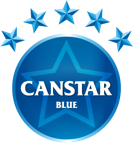If your internet plan isn’t delivering on its promised fast speeds, it might be held back by other households using the same provider as you during peak hours.
In this article Canstar Blue explains why internet contention ratios could be the reason your home broadband performance is lacking.
What is internet contention ratio?
An internet contention ratio refers to the number of households sharing the same internet provider at the same time. A higher ratio means more users are trying to access the internet simultaneously, which can result in slower internet speeds.
You may see this ratio expressed as numbers, which reflect the demand compared to the available bandwidth. For example, a contention ratio of 1:10 means that you share available bandwidth with 10 others and you have a guaranteed speed of 1.
In simpler terms, think of contention ratio like driving on a busy road with limited lanes – everyone is trying to use it, causing heavy traffic. Each driver gets an equally divided share of the road, with the speed of the traffic dependent on the number of cars. This speed is further reduced by the maximum speed that’s actually available on your plan.
When fewer people are using the internet, the road is clear. However, during peak hours (7pm to 11pm), you’ll experience heavy traffic from other households with the same provider. This higher contention ratio means your internet speeds are likely to be slower.
How can I get a good contention ratio?
To ensure you get the best possible NBN speed, consider signing up for a higher-speed plan. The typical evening speed advertised by a provider is a good indication as to whether the contention ratio is low (more on this below).
Compare NBN plans
Check out the NBN plans in the table below, and find the right plan for you. Alternatively, you can use our free comparison tool to find the perfect plan.
The following table shows a selection of sponsored unlimited data Standard Plus Evening Speed (NBN 50), and Premium Evening Speed (NBN 100) plans on Canstar Blue’s database with links to referral partners..
 |
1 Month Contract (1 month min. cost $65.00) Typical evening speed of 100Mbps
|
Unlimited Data/month |
$65.00 Cost/month |
Go to Site |
 |
1 Month Contract (1 month min. cost $68.90) Typical evening speed of 50Mbps
|
Unlimited Data/month |
$68.90 Cost/month |
Go to Site |
 |
1 Month Contract (1 month min. cost $79.99) Typical evening speed of 100Mbps
|
Unlimited Data/month |
$79.99 Cost/month |
Go to Site |
Unlimited Home Standard (NBN 50) Plans
The following table shows a selection of published unlimited NBN 50 plans on Canstar Blue’s database, listed in order of standard monthly cost (excluding discounts), from the lowest to highest, and then by alphabetical order of provider. Use our comparison tool above to see plans from a range of other providers. This is a selection of products with links to referral partners.
Unlimited Home Fast (NBN 100) Plans
The table below shows a selection of published unlimited NBN 100 plans on Canstar Blue’s database, listed in order of monthly cost, from the lowest to highest, and then by alphabetical order of provider. Use our comparison tool to see plans from a range of other providers. This is a selection of products with links to referral partners.
How fast will my internet be?
If you’ve switched to an NBN connection and selected a specific speed tier, you can generally expect a performance close to your provider’s reported typical evening speed. However, this isn’t guaranteed at all times.
For example, if you’re on an NBN 25 plan, your internet service provider (ISP) might report typical evening speeds of 22Mbps (megabits per second). However, when you perform a speed test, you might only get 18Mbps. This could be due to the demand on the network (as well as other factors that can cause a slow internet speed).
Is a low contention ratio good?
The lower the internet contention ratio, the better. A low contention ratio means your NBN speed is consistently fast, and the provider you’re with is better at catering to the customers on its network.
Of course, the ideal contention ratio is 1:1, but this is only a viable option for big businesses. For residential users, contention ratios of between 1:30 and 1:50 are more common.
However, it’s rare that ISPs advertise contention ratios. In Australia, providers instead advertise the typical evening speeds offered on NBN or broadband plans. Typical evening speeds refer to the average download speed achieved by most customers during peak hours.
Finding a plan with a fast typical evening speed is a good indicator of a low contention ratio. The downside is that most broadband plans are priced by speed, so you’ll need to find a balance between performance and budget.
To browse a huge range of NBN options by price, speed and more, head to Canstar Blue’s free internet comparison tool.




Share this article